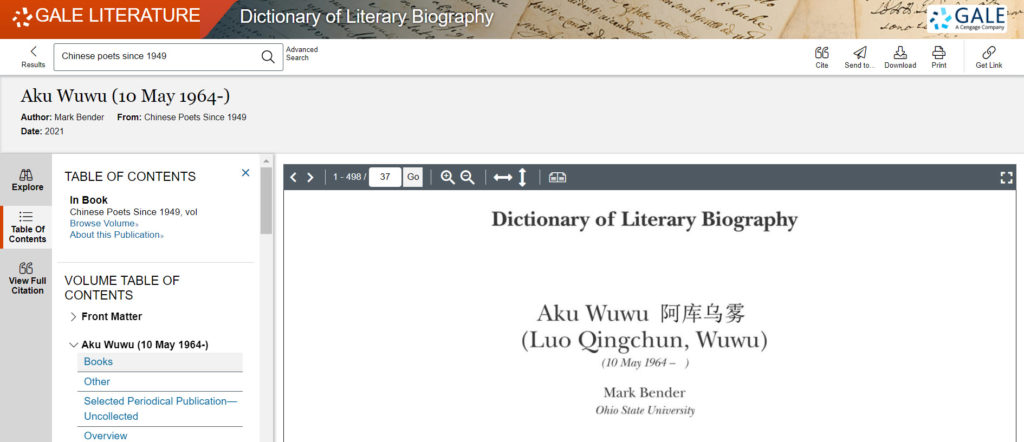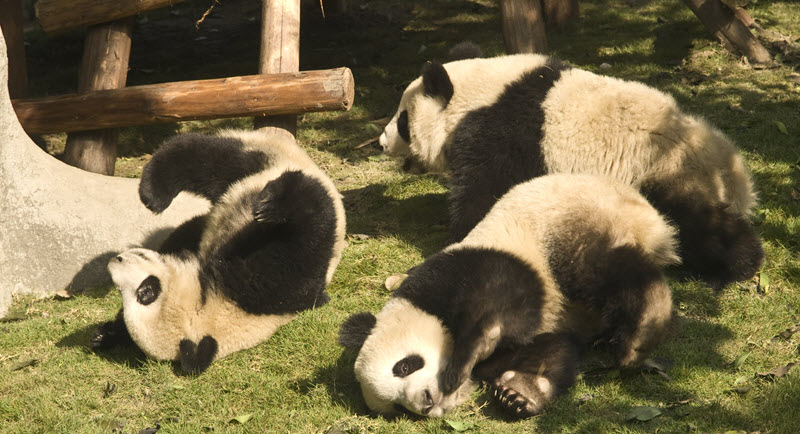|由Rebecca Parks |
When my brother went to China on vacation a couple years ago, he brought me back a beautiful miniature black-lacquered paneled screen as a souvenir. He had to look long and hard for a screen that did NOT include pandas on it, knowing I would object to something so clichéd. Apparently, these items are marketed heavily to the tourist trade, and most tourists want pandas. After all, what says “China” to the Western visitor more than cuddly, bamboo-eating black-and-white bears?
这不是一个不合理的协会。我通过公共广播国际的2019年报告Gale Literature Resource Centerdatabase the other day that talked about China’s ownership of the world’s pandas—not just the 1,800+ living in their natural habitat in a few mountain ranges in south-central China, but also the approximately 500 pandas on loan to zoos throughout the world and any babies that are born through captive breeding programs. Apparently, zoos pay annual rental fees of up to $1 million to China for panda pairs in 10-year increments; if a baby is born from that pair, the zoo pays an additional $400,000 fee AND China gets to take the baby back at four years old for its domestic breeding program. I have清楚进入错误的业务;熊猫租赁是去的方式。
Pandas aren’t just a lucrative export for China; they also serve as the world’s cutest diplomatic pawns, with favored nations getting the privilege of hosting pandas. China has also been known to take back pandas if they are displeased. For example, when U.S. president Barack Obama met with the Dalai Lama over China’s objections in February 2010, China repatriated two pandas from U.S. zoos. When it comes to ursine trade wars, China is holding all the cards.
那么为什么我读到中国的熊猫垄断?Because I really didn’t want to read about all the other China-related news that’s been churning in 2020: coronavirus outbreak origin stories/conspiracies, the sparring between U.S. president Donald Trump and Beijing over tariffs and unfair trade practices, and even the backlash by Chinese fans over the comments by BTS frontman RM about the Korean War, which they interpreted as slighting the Chinese losses in the same conflict. When it comes to news about China in the American press, I very rarely hear anything positive.
当足够的负面消息堆积时,我发现自己埋在它下面,为空中努力,将清楚地思考中国的令人窒息的社会建设,这是一些整体的“其他”,这是一个方便的超级小人,议程总是运行柜台mine—or at least to my country’s. For the super-villain narrative to work, however, China has to be portrayed with black-and-white clarity as defined as the panda itself, erasing nuances, shadings, and the diversity that is natural to humanity. That’s not cute, and it’s not accurate, even if it does serve the purpose of a 500-word article. Accurately portraying the real culture, the real person, the real country, the realanythingrequires the reader to look deeper.
Take, for example, the recent publication of Gale’sDictionary of Literary Biography,1949年自1949年以来的中国诗人的第387卷,可通过印刷和数据库形式提供Gale Literature: Dictionary of Literary Biography. The year 1949 marks the beginning of the People’s Republic of China as the climax of the Communist Revolution. It would be easy to paint Chinese poetry from this period with the broad brush of conformity to state control in service to the Communist agenda. Yet, reading through this volume, I’m astonished at the diversity of viewpoints, directly contradicting the rigid uniformity that is an unfortunate stereotype of China.

该卷涵盖了来自内地的45个主要当代诗人以及香港和台湾,由现代中国诗歌中英语写作的领导学者组成。令人惊叹的频谱包括诗歌(B. 1948)诗人,谁是在文化革命期间公开生产诗歌的诗歌之一,同时仔细导航毛泽东的严格定义文化适当的文学。其他内地诗人,如吉贤(1913-2013),中国现代主义运动的领导者,拒绝符合台湾,在那里他创立了首要的现代主义出版物咸田施(Modern Poetry), which was unabashedly anti-Communist.
在1976年的文化大革命结束时,并在放松的限制时,一代青年将开始一个被称为毛泽东诗歌运动的前卫诗歌孟龙施(misty or obscure poetry), a term initially considered pejorative but later embraced. This volume includes the stories of these poets, such as Bei Dao (b. 1949), who initially started writing poetry to distract himself from the monotony and despair of his life while being “reeducated” in the countryside, and who would go on to start the influential underground journal吉天(今天)。一些吉天诗人是文化革命计划的一部分,向农村向农村派遣城市教育的青年,担任手工劳动者,包括芒克(1950年)和杨连(1955年)。
第三代诗人追随吉天诗人写道,虽然他们的风格也是前卫的众多不同的经验。海子(1964-1989),Xi Chuan(1963年)等主要人物,以及LAN LAN(B.1967)在文化气候不是限制性的时候来到年龄年轻诗人在中国的大学接触西方文学,并受益于社会的更大自由。与他们相比,他们复杂,复杂的句法结构和不和谐的图像。Minjian shige(诗歌的人民或诗歌)由诗人Yu Jian(b。1954)和汉东(b。1961),他们愿意写出更多可访问的诗歌,任何人都可以很容易地理解和赞赏。
在阅读这些传记中,我认为更大的运动内容:他们的诗意创新,他们的艺术成就,他们独特的职业道路,他们的斗争,他们所寻求将自己定义为个人在遭受地震变化的社会中的人的方式,他们符合或反叛外部尝试定义它们。他们的故事是鼓舞人心的,照亮,有时会令人心碎,但却在一起提供了一种中国文化成就的画面,使各个螺纹被编织在一起,以创造一个多彩的丝绸挂毯。
但是,拜托,我的挂毯上没有熊猫。


